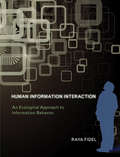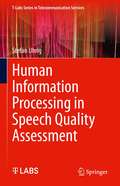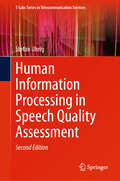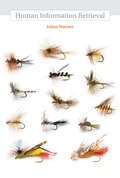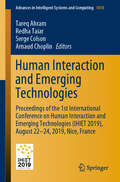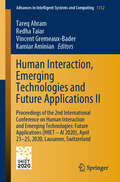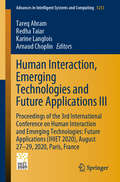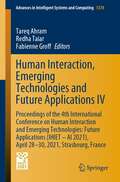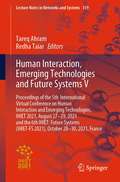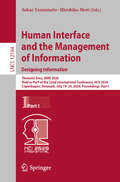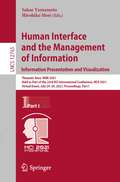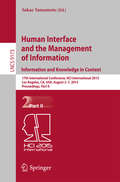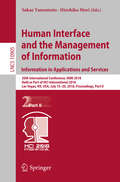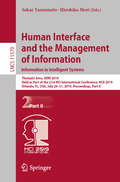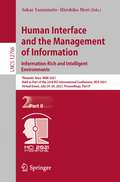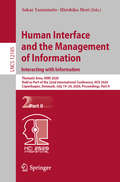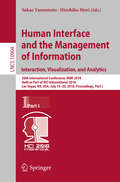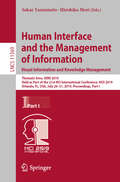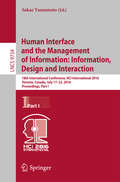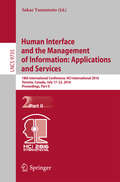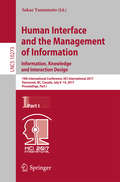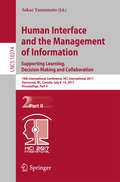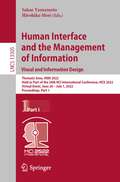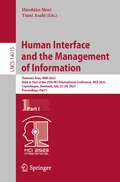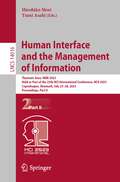- Table View
- List View
Human Information Interaction: An Ecological Approach to Information Behavior (The\mit Press Ser.)
by Raya FidelA fresh research approach that bridges the study of human information interaction and the design of information systems.Human information interaction (HII) is an emerging area of study that investigates how people interact with information; its subfield human information behavior (HIB) is a flourishing, active discipline. Yet despite their obvious relevance to the design of information systems, these research areas have had almost no impact on systems design. One issue may be the contextual complexity of human interaction with information; another may be the difficulty in translating real-life and unstructured HII complexity into formal, linear structures necessary for systems design. In this book, Raya Fidel proposes a research approach that bridges the study of human information interaction and the design of information systems: cognitive work analysis (CWA). Developed by Jens Rasmussen and his colleagues, CWA embraces complexity and provides a conceptual framework and analytical tools that can harness it to create design requirements. CWA offers an ecological approach to design, analyzing the forces in the environment that shape human interaction with information.Fidel reviews research in HIB, focusing on its contribution to systems design, and then presents the CWA framework. She shows that CWA, with its ecological approach, can be used to overcome design challenges and lead to the development of effective systems. Researchers and designers who use CWA can increase the diversity of their analytical tools, providing them with an alternative approach when they plan research and design projects. The CWA framework enables a collaboration between design and HII that can create information systems tailored to fit human lives.
Human Information Processing in Speech Quality Assessment (T-Labs Series in Telecommunication Services)
by Stefan UhrigThis book provides a new multi-method, process-oriented approach towards speech quality assessment, which allows readers to examine the influence of speech transmission quality on a variety of perceptual and cognitive processes in human listeners. Fundamental concepts and methodologies surrounding the topic of process-oriented quality assessment are introduced and discussed. The book further describes a functional process model of human quality perception, which theoretically integrates results obtained in three experimental studies. This book’s conceptual ideas, empirical findings, and theoretical interpretations should be of particular interest to researchers working in the fields of Quality and Usability Engineering, Audio Engineering, Psychoacoustics, Audiology, and Psychophysiology.
Human Information Processing in Speech Quality Assessment (T-Labs Series in Telecommunication Services)
by Stefan UhrigThis updated book introduces a new process-oriented approach towards speech quality assessment. Using multiple methods, this approach allows readers to investigate the influence of speech transmission quality on perceptual and cognitive processes in human listeners. Fundamental concepts and methods related to the topic of process-oriented speech quality assessment are introduced and discussed. Moreover, a functional process model of speech quality perception is described, which theoretically integrates the results obtained in three experimental studies. This book’s conceptual ideas, empirical findings, and theoretical interpretations should be of particular interest to researchers working in the fields of Quality and Usability Engineering, Audio Engineering, Psychoacoustics, Psychophysiology, and Audiology.
Human Information Retrieval (History and Foundations of Information Science)
by Julian WarnerAn overview of information retrieval rooted in the humanities and social sciences but informed by an understanding of information technology and information theory. Information retrieval in the age of Internet search engines has become part of ordinary discourse and everyday practice: “Google” is a verb in common usage. Thus far, more attention has been given to practical understanding of information retrieval than to a full theoretical account. In Human Information Retrieval, Julian Warner offers a comprehensive overview of information retrieval, synthesizing theories from different disciplines (information and computer science, librarianship and indexing, and information society discourse) and incorporating such disparate systems as WorldCat and Google into a single, robust theoretical framework. There is a need for such a theoretical treatment, he argues, one that reveals the structure and underlying patterns of this complex field while remaining congruent with everyday practice.Warner presents a labor theoretic approach to information retrieval, building on his previously formulated distinction between semantic and syntactic mental labor, arguing that the description and search labor of information retrieval can be understood as both semantic and syntactic in character. Warner's information science approach is rooted in the humanities and the social sciences but informed by an understanding of information technology and information theory. The chapters offer a progressive exposition of the topic, with illustrative examples to explain the concepts presented. Neither narrowly practical nor largely speculative, Human Information Retrieval meets the contemporary need for a broader treatment of information and information systems.
Human Interaction and Emerging Technologies: Proceedings of the 1st International Conference on Human Interaction and Emerging Technologies (IHIET 2019), August 22-24, 2019, Nice, France (Advances in Intelligent Systems and Computing #1018)
by Tareq Ahram Redha Taiar Serge Colson Arnaud ChoplinThis book reports on research and developments in human-technology interaction. A special emphasis is given to human-computer interaction, and its implementation for a wide range of purposes such as healthcare, aerospace, telecommunication, and education, among others. The human aspects are analyzed in detail. Timely studies on human-centered design, wearable technologies, social and affective computing, augmented, virtual and mixed reality simulation, human rehabilitation and biomechanics represent the core of the book. Emerging technology applications in business, security, and infrastructure are also critically examined, thus offering a timely, scientifically-grounded, but also professionally-oriented snapshot of the current state of the field. The book is based on contributions presented at the 1st International Conference on Human Interaction and Emerging Technologies, IHIET 2019, held on August 22-24, in Nice, France. It offers a timely survey and a practice-oriented reference guide to systems engineers, psychologists, sport scientists, physical therapists, as well as decision-makers, designing or dealing with the new generation of service systems.User Experience of a Social Media Based Knowledge Sharing System in Industry Work, Chapter of this book is available open access under a CC BY 4.0 license at link.springer.com
Human Interaction, Emerging Technologies and Future Applications II: Proceedings of the 2nd International Conference on Human Interaction and Emerging Technologies: Future Applications (IHIET – AI 2020), April 23-25, 2020, Lausanne, Switzerland (Advances in Intelligent Systems and Computing #1152)
by Tareq Ahram Redha Taiar Vincent Gremeaux-Bader Kamiar AminianThis book reports on research and developments in human-technology interaction. A special emphasis is given to human-computer interaction, and its implementation for a wide range of purposes such as healthcare, aerospace, telecommunication, and education, among others. The human aspects are analyzed in detail. Timely studies on human-centered design, wearable technologies, social and affective computing, augmented, virtual and mixed reality simulation, human rehabilitation and biomechanics represent the core of the book. Emerging technology applications in business, security, and infrastructure are also critically examined, thus offering a timely, scientifically-grounded, but also professionally-oriented snapshot of the current state of the field. The book is based on contributions presented at the 2nd International Conference on Human Interaction and Emerging Technologies: Future Applications, IHIET-AI 2020, held on April 23-25, in Lausanne, Switzerland. It offers a timely survey and a practice-oriented reference guide to researchers and professionals dealing with design and/or management of the new generation of service systems.
Human Interaction, Emerging Technologies and Future Applications III: Proceedings of the 3rd International Conference on Human Interaction and Emerging Technologies: Future Applications (IHIET 2020), August 27-29, 2020, Paris, France (Advances in Intelligent Systems and Computing #1253)
by Tareq Ahram Redha Taiar Arnaud Choplin Karine LangloisThis book reports on research and developments in human-technology interaction. A special emphasis is given to human-computer interaction, and its implementation for a wide range of purposes such as healthcare, aerospace, telecommunication, and education, among others. The human aspects are analyzed in detail. Timely studies on human-centered design, wearable technologies, social and affective computing, augmented, virtual and mixed reality simulation, human rehabilitation and biomechanics represent the core of the book. Emerging technology applications in business, security, and infrastructure are also critically examined, thus offering a timely, scientifically-grounded, but also professionally-oriented snapshot of the current state of the field. The book is based on contributions presented at the 3rd International Conference on Human Interaction and Emerging Technologies: Future Applications, IHIET 2020, held on August 27-29, 2020. It offers a timely survey and a practice-oriented reference guide to researchers and professionals dealing with design and/or management of the new generation of service systems.
Human Interaction, Emerging Technologies and Future Applications IV: Proceedings of the 4th International Conference on Human Interaction and Emerging Technologies: Future Applications (IHIET – AI 2021), April 28-30, 2021, Strasbourg, France (Advances in Intelligent Systems and Computing #1378)
by Tareq Ahram Redha Taiar Fabienne GroffThis book reports on research and developments in human-technology interaction. A special emphasis is given to human-computer interaction, and its implementation for a wide range of purposes such as healthcare, manufacturing, transportation, and education, among others. The human aspects are analyzed in detail. Innovative studies related to human-centered design, wearable technologies, augmented, virtual and mixed reality simulation, as well as developments and applications of machine learning and AI for different purposes, represent the core of the book. Emerging issues in business, security, and infrastructure are also critically examined, thus offering a timely, scientifically-grounded, but also professionally-oriented snapshot of the current state of the field. The book is based on contributions presented at the 4th International Conference on Human Interaction and Emerging Technologies: Future Applications, IHIET-AI 2021, held on April 28-30, 2021, in Strasbourg, France. It offers a timely survey and a practice-oriented reference guide to researchers and professionals dealing with design and/or management of the new generation of service systems.
Human Interaction, Emerging Technologies and Future Systems V: Proceedings of the 5th International Virtual Conference on Human Interaction and Emerging Technologies, IHIET 2021, August 27-29, 2021 and the 6th IHIET: Future Systems (IHIET-FS 2021), October 28-30, 2021, France (Lecture Notes in Networks and Systems #319)
by Tareq Ahram Redha TaiarThis book reports on research and developments in human–technology interaction. A special emphasis is given to human–computer interaction and its implementation for a wide range of purposes such as health care, aerospace, telecommunication, and education, among others. The human aspects are analyzed in detail. Timely studies on human-centered design, wearable technologies, social and affective computing, augmented, virtual and mixed reality simulation, human rehabilitation, and biomechanics represent the core of the book. Emerging technology applications in business, security, and infrastructure are also critically examined, thus offering a timely, scientifically grounded, but also professionally oriented snapshot of the current state of the field. The book gathers contributions presented at the 5th International Conference on Human Interaction and Emerging Technologies (IHIET 2021, August 27–29, 2021) and the 6th International Conference on Human Interaction and Emerging Technologies: Future Systems (IHIET-FS 2021, October 28–30, 2021), held virtually from France. It offers a timely survey and a practice-oriented reference guide to researchers and professionals dealing with design, systems engineering, and management of the next-generation technology and service systems.
Human Interface and the Management of Information. Designing Information: Thematic Area, HIMI 2020, Held as Part of the 22nd International Conference, HCII 2020, Copenhagen, Denmark, July 19–24, 2020, Proceedings, Part I (Lecture Notes in Computer Science #12184)
by Sakae Yamamoto Hirohiko MoriThis two-volume set LNCS 12184 and 12185 constitutes the refereed proceedings of the Thematic Area on Human Interface and the Management of Information, HIMI 2020, held as part of HCI International 2020 in Copenhagen, Denmark.* HCII 2020 received a total of 6326 submissions, of which 1439 papers and 238 posters were accepted for publication after a careful reviewing process. The 72 papers presented in the two volumes were organized in the following topical sections: Part I: information presentation and visualization; service design and management; and information in VR and AR. Part II: recommender and decision support systems; information, communication, relationality and learning; supporting work, collaboration and creativity; and information in intelligent systems and environments. *The conference was held virtually due to the COVID-19 pandemic.
Human Interface and the Management of Information. Information Presentation and Visualization: Thematic Area, HIMI 2021, Held as Part of the 23rd HCI International Conference, HCII 2021, Virtual Event, July 24–29, 2021, Proceedings, Part I (Lecture Notes in Computer Science #12765)
by Sakae Yamamoto Hirohiko MoriThe two-volume set LNCS 12765-12766 constitutes the refereed proceedings of the thematic area Human Interface and the Management of Information, HIMI 2021, which was held as part of HCI International 2021 and took place virtually during July 24-29, 2021.The total of 1276 papers and 241 posters included in the 39 HCII 2021 proceedings volumes was carefully reviewed and selected from 5222 submissions. The papers included in the HCII-HIMI volume set were organized in topical sections as follows: Part I: Information presentation; visualization and decision making support; information in VR and multimodal user interfaces; Part II: Learning in information-rich environments; supporting work, collaboration and design; intelligent information environments.
Human Interface and the Management of Information. Information and Knowledge in Context
by Sakae YamamotoThe two-volume set LNCS 9172 and 9173 constitutes the refereed proceedings of the Human Interface and the Management of Information thematic track, held as part of the 17th International Conference on Human-Computer Interaction, HCII 2015, held in Los Angeles, CA, USA, in August 2015, jointly with 15 other thematically similar conferences. The total of 1462 papers and 246 posters presented at the HCII 2015 conferences were carefully reviewed and selected from 4843 submissions. These papers address the latest research and development efforts and highlight the human aspects of design and use of computing systems. The papers accepted for presentation thoroughly cover the entire field of human-computer interaction, addressing major advances in knowledge and effective use of computers in a variety of application areas. This volume contains papers addressing the following major topics: context modelling and situational awareness; decision-support systems; information and interaction for driving; information and interaction for learning and education; information and interaction for culture and art; supporting work and collaboration; information and interaction for safety, security and reliability; information and interaction for novel advanced environments.
Human Interface and the Management of Information. Information in Applications and Services: 20th International Conference, HIMI 2018, Held as Part of HCI International 2018, Las Vegas, NV, USA, July 15-20, 2018, Proceedings, Part II (Lecture Notes in Computer Science #10905)
by Sakae Yamamoto Hirohiko MoriThis two-volume set LNCS 10904 and 10905 constitutes the refereed proceedings of the 20th International Conference on Human Interface and the Management of Information, HIMI 2018, held as part of HCI International 2018 in Las Vegas, NV, USA, in July 2018.The total of 1170 papers and 195 posters included in the 30 HCII 2018 proceedings volumes was carefully reviewed and selected from 4373 submissions.The 53 papers presented in this volume were organized in topical sections named: interacting with information; information and learning; information in aviation and transport; intelligent systems; and sevice management.
Human Interface and the Management of Information. Information in Intelligent Systems: Thematic Area, HIMI 2019, Held as Part of the 21st HCI International Conference, HCII 2019, Orlando, FL, USA, July 26-31, 2019, Proceedings, Part II (Lecture Notes in Computer Science #11570)
by Sakae Yamamoto Hirohiko MoriThis two-volume set LNCS 11569 and 11570 constitutes the refereed proceedings of the Thematic Area on Human Interface and the Management of Information, HIMI 2019, held as part of HCI International 2019 in Orlando, FL, USA.HCII 2019 received a total of 5029 submissions, of which 1275 papers and 209 posters were accepted for publication after a careful reviewing process. The 91 papers presented in the two volumes were organized in topical sections named: Visual information; Data visualization and analytics; Information, cognition and learning; Information, empathy and persuasion; Knowledge management and sharing; Haptic and tactile interaction; Information in virtual and augmented reality; Machine learning and intelligent systems; Human motion and expression recognition and tracking; Medicine, healthcare and quality of life applications.
Human Interface and the Management of Information. Information-Rich and Intelligent Environments: Thematic Area, HIMI 2021, Held as Part of the 23rd HCI International Conference, HCII 2021, Virtual Event, July 24–29, 2021, Proceedings, Part II (Lecture Notes in Computer Science #12766)
by Sakae Yamamoto Hirohiko MoriThe two-volume set LNCS 12765-12766 constitutes the refereed proceedings of the thematic area Human Interface and the Management of Information, HIMI 2021, which was held as part of HCI International 2021 and took place virtually during July 24-29, 2021.The total of 1276 papers and 241 posters included in the 39 HCII 2021 proceedings volumes was carefully reviewed and selected from 5222 submissions. The papers included in the HCII-HIMI volume set were organized in topical sections as follows: Part I: Information presentation; visualization and decision making support; information in VR and multimodal user interfaces; Part II: Learning in information-rich environments; supporting work, collaboration and design; intelligent information environments.
Human Interface and the Management of Information. Interacting with Information: Thematic Area, HIMI 2020, Held as Part of the 22nd International Conference, HCII 2020, Copenhagen, Denmark, July 19–24, 2020, Proceedings, Part II (Lecture Notes in Computer Science #12185)
by Sakae Yamamoto Hirohiko MoriThis two-volume set LNCS 12184 and 12185 constitutes the refereed proceedings of the Thematic Area on Human Interface and the Management of Information, HIMI 2020, held as part of HCI International 2020 in Copenhagen, Denmark.* HCII 2020 received a total of 6326 submissions, of which 1439 papers and 238 posters were accepted for publication after a careful reviewing process. The 72 papers presented in the two volumes were organized in the following topical sections: Part I: information presentation and visualization; service design and management; and information in VR and AR. Part II: recommender and decision support systems; information, communication, relationality and learning; supporting work, collaboration and creativity; and information in intelligent systems and environments. *The conference was held virtually due to the COVID-19 pandemic.
Human Interface and the Management of Information. Interaction, Visualization, and Analytics: 20th International Conference, HIMI 2018, Held as Part of HCI International 2018, Las Vegas, NV, USA, July 15-20, 2018, Proceedings, Part I (Lecture Notes in Computer Science #10904)
by Sakae Yamamoto Hirohiko MoriThis two-volume set LNCS 10904 and 10905 constitutes the refereed proceedings of the 20th International Conference on Human Interface and the Management of Information, HIMI 2018, held as part of HCI International 2018 in Las Vegas, NV, USA, in July 2018.The total of 1170 papers and 195 posters included in the 30 HCII 2018 proceedings volumes was carefully reviewed and selected from 4373 submissions.The 56 papers presented in this volume were organized in topical sections named: information visualization; multimodal interaction; information in virtual and augmented reality; information and vision; and text and data mining and analytics.
Human Interface and the Management of Information. Visual Information and Knowledge Management: Thematic Area, HIMI 2019, Held as Part of the 21st HCI International Conference, HCII 2019, Orlando, FL, USA, July 26–31, 2019, Proceedings, Part I (Lecture Notes in Computer Science #11569)
by Sakae Yamamoto Hirohiko MoriThis two-volume set LNCS 11569 and 11570 constitutes the refereed proceedings of the Thematic Area on Human Interface and the Management of Information, HIMI 2019, held as part of HCI International 2019 in Orlando, FL, USA.HCII 2019 received a total of 5029 submissions, of which 1275 papers and 209 posters were accepted for publication after a careful reviewing process. The 91 papers presented in the two volumes were organized in topical sections named: Visual information; Data visualization and analytics; Information, cognition and learning; Information, empathy and persuasion; Knowledge management and sharing; Haptic and tactile interaction; Information in virtual and augmented reality; Machine learning and intelligent systems; Human motion and expression recognition and tracking; Medicine, healthcare and quality of life applications.
Human Interface and the Management of Information: 18th International Conference, HCI International 2016 Toronto, Canada, July 17-22, 2016, Proceedings, Part I (Lecture Notes in Computer Science #9734)
by Sakae YamamotoThe two-volume set LNCS 9734 and 9735 constitutes the refereed proceedings of the Human Interface and the Management of Information thematic track, held as part of the 18th International Conference on Human-Computer Interaction, HCII 2016, held in Toronto, Canada, in July 2016. HCII 2016 received a total of 4354 submissions of which 1287 papers were accepted for publication after a careful reviewing process. These papers address the latest research and development efforts and highlight the human aspects of design and use of computing systems. The papers accepted for presentation thoroughly cover the entire field of human-computer interaction, addressing major advances in knowledge and effective use of computers in a variety of application areas This volume contains papers addressing the following major topics: information presentation; big data visualization; information analytics; discovery and exploration; interaction design, human-centered design; haptic, tactile and multimodal interaction.
Human Interface and the Management of Information: Applications and Services
by Sakae YamamotoThe two-volume set LNCS 8521 and 8522 constitutes the refereed proceedings of the Human Interface and the Management of Information thematic track, held as part of the 16th International Conference on Human-Computer Interaction, HCII 2014, held in Heraklion, Greece, in June 2014, jointly with 13 other thematically similar conferences. The total of 1476 papers and 220 posters presented at the HCII 2014 conferences were carefully reviewed and selected from 4766 submissions. These papers address the latest research and development efforts and highlight the human aspects of design and use of computing systems. The papers accepted for presentation thoroughly cover the entire field of human-computer interaction, addressing major advances in knowledge and effective use of computers in a variety of application areas. This volume contains papers addressing the following major topics: e-learning and e-education; decision support; information and interaction in aviation and transport; safety, security and reliability; communication, expression and emotions; art, culture and creativity; information and knowledge in business and society.
Human Interface and the Management of Information: Information, Knowledge and Interaction Design
by Sakae YamamotoThe two-volume set LNCS 10273 and 10274 constitutes the refereed proceedings of the thematic track on Human Interface and the Management of Information, held as part of the 19th HCI International 2017, in Vancouver, BC, Canada, in July 2017. HCII 2017 received a total of 4340 submissions, of which 1228 papers were accepted for publication after a careful reviewing process. The 102 papers presented in these volumes were organized in topical sections as follows: Part I: Visualization Methods and Tools; Information and Interaction Design; Knowledge and Service Management; Multimodal and Embodied Interaction. Part II: Information and Learning; Information in Virtual and Augmented Reality; Recommender and Decision Support Systems; Intelligent Systems; Supporting Collaboration and User Communities; Case Studies.
Human Interface and the Management of Information: Supporting Learning, Decision-Making and Collaboration
by Sakae YamamotoThe two-volume set LNCS 10273 and 10274 constitutes the refereed proceedings of the thematic track on Human Interface and the Management of Information, held as part of the 19th HCI International 2017, in Vancouver, BC, Canada, in July 2017. HCII 2017 received a total of 4340 submissions, of which 1228 papers were accepted for publication after a careful reviewing process. The 102 papers presented in these volumes were organized in topical sections as follows: Part I: Visualization Methods and Tools; Information and Interaction Design; Knowledge and Service Management; Multimodal and Embodied Interaction. Part II: Information and Learning; Information in Virtual and Augmented Reality; Recommender and Decision Support Systems; Intelligent Systems; Supporting Collaboration and User Communities; Case Studies.
Human Interface and the Management of Information: Thematic Area, HIMI 2022, Held as Part of the 24th HCI International Conference, HCII 2022, Virtual Event, June 26 – July 1, 2022, Proceedings, Part I (Lecture Notes in Computer Science #13305)
by Sakae Yamamoto Hirohiko MoriThis two-volume set LNCS 13305 - 13306 constitutes the thoroughly refereed proceedings of the thematic area Human Interface and the Management of Information, HIMI 2022, which was held as part of HCI International 2022 and took place virtually during June 26-July 1, 2022.The total of 1271 papers and 275 poster papers included in the 39 HCII 2022 proceedings volumes was carefully reviewed and selected from 5487 submissions. The papers included in the HCII-HIMI volume set were organized in topical sections as follows: Part I: Human-centered design approaches; information design and quality; visual design; visualization and big data; Information, cognition and learning. Part II: Recommender systems; robots and avatars appearance and embodiment; information in virtual and augmented reality; information in complex technological environments.
Human Interface and the Management of Information: Thematic Area, HIMI 2023, Held as Part of the 25th HCI International Conference, HCII 2023, Copenhagen, Denmark, July 23–28, 2023, Proceedings, Part I (Lecture Notes in Computer Science #14015)
by Hirohiko Mori Yumi AsahiThis two-volume set LNCS 14015 - 14016 constitutes the thoroughly refereed proceedings of the thematic area Human Interface and the Management of Information, HIMI 2023, which was held as part of HCI International 2023 which took place in Copenhagen, Denmark, during July 23-28, 2023.A total of 1578 papers and 396 posters have been accepted for publication in the HCII 2023 proceedings from a total of 7472 submissions. The papers included in the HCII-HIMI volume set were organized in topical sections as follows: Part I: Information design and user experience; data visualization and big data; multimodal interaction; interacting with AI and intelligent systems; Part II: Service design; knowledge in eLearning and eEducation; supporting work and collaboration.
Human Interface and the Management of Information: Thematic Area, HIMI 2023, Held as Part of the 25th HCI International Conference, HCII 2023, Copenhagen, Denmark, July 23–28, 2023, Proceedings, Part II (Lecture Notes in Computer Science #14016)
by Hirohiko Mori Yumi AsahiThis two-volume set LNCS 14015 - 14016 constitutes the thoroughly refereed proceedings of the thematic area Human Interface and the Management of Information, HIMI 2023, which was held as part of HCI International 2023 which took place in Copenhagen, Denmark, during July 23-28, 2023.A total of 1578 papers and 396 posters have been accepted for publication in the HCII 2023 proceedings from a total of 7472 submissions. The papers included in the HCII-HIMI volume set were organized in topical sections as follows: Part I: Information design and user experience; data visualization and big data; multimodal interaction; interacting with AI and intelligent systems; Part II: Service design; knowledge in eLearning and eEducation; supporting work and collaboration.
